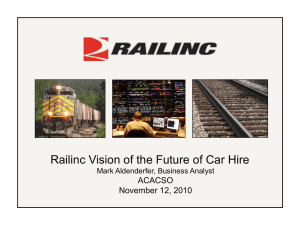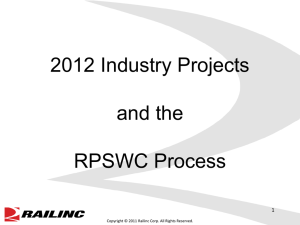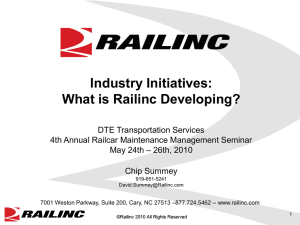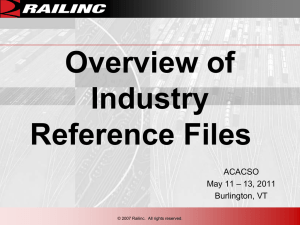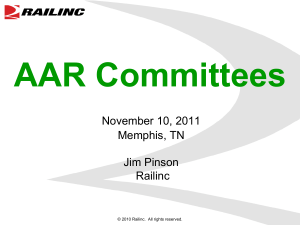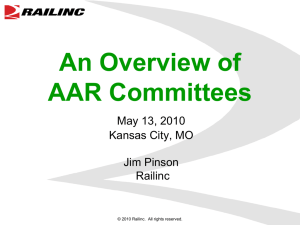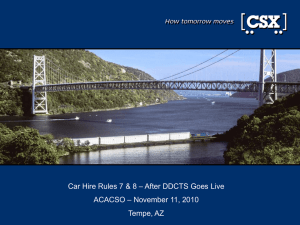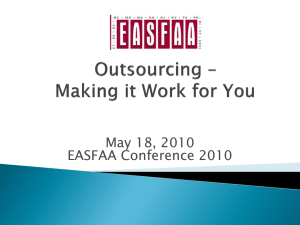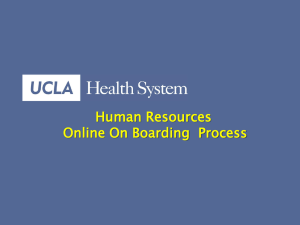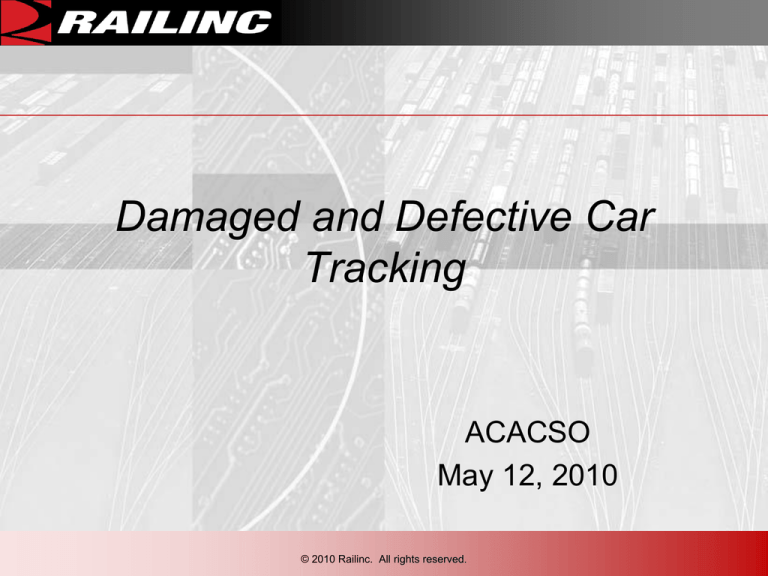
Damaged and Defective Car
Tracking
ACACSO
May 12, 2010
© 2010 Railinc. All rights reserved.
Discussion Topics
• Project Goals
• DDCT Example
• Key LCS Events
– Car Hire Rule 7
– Car Hire Rule 8
• Question and Answer
© 2010 Railinc. All rights reserved.
Project Goals
© 2010 Railinc. All rights reserved.
Project Goals
• Create a secure web-based data capture
system that facilitates the exchange of
information related to damaged and
defective cars
• Allow data to be updated as handling of
damaged/defective cars progresses
• Communicate updated information to the
appropriate parties
© 2010 Railinc. All rights reserved.
Project Goals
• Provide electronic notices when updates
are not received as expected
• Eliminate reclaim under Car Hire Rules 7
and 8
• Maintain audit logs and historical records
of the transactions handled
• Allow for ad hoc inquiries into the system
• Accommodate electronic interface with the
system (use of web services)
© 2010 Railinc. All rights reserved.
AAR Rule 1/108 - Car Hire Rule 8
© 2010 Railinc. All rights reserved.
Access to the application is governed by Railinc’s Single Sign-on Security
© 2010 Railinc. All rights reserved.
Handling Railroad creates a Rule 1 or 108 incident on the “Create Incident” Screen
The Handling Road must provide a valid SPLC and Incident Date
© 2010 Railinc. All rights reserved.
The Handling Road will identify defects with the car as part of creating the incident
© 2010 Railinc. All rights reserved.
Once the incident is created, the Handling Road can request disposition for the car
© 2010 Railinc. All rights reserved.
The Handling Road must provide contact information for the Car Owner to use for offline
communications about the incident
© 2010 Railinc. All rights reserved.
The Handling Road provides additional details for the car owner to provide disposition
for the car such as commodity and load/empty status
© 2010 Railinc. All rights reserved.
The Car Owner will then provide a shop location to send the car home or indicate that
the Handling Road may repair the car
© 2010 Railinc. All rights reserved.
The Car Owner also has the option to authorize the Handling Road to scrap the car
(for a Rule 108 incident)
© 2010 Railinc. All rights reserved.
AAR Rule 107 / Car Hire Rule 7
© 2010 Railinc. All rights reserved.
The Damaging Railroad creates a Rule 107 incident on the “Create Incident” Screen
The Damaging Road must provide a valid SPLC, Incident Date, and Incident Type
© 2010 Railinc. All rights reserved.
Once the Incident is created, the Estimated DV is automatically presented
© 2010 Railinc. All rights reserved.
After the Damaging Railroad requests Actual DV from the Car Owner,
the Car Owner can view incidents pending Actual DV/Disposition
© 2010 Railinc. All rights reserved.
The Damaging Road can also offer settlement on the car once the owner provides the
actual depreciated value
© 2010 Railinc. All rights reserved.
The Car Owner is notified that settlement has been offered by the Damaging Road,
and has the option to accept or reject the settlement value
© 2010 Railinc. All rights reserved.
The Damaging Road can also create an electronic Defect Card for the Car –
All defect cards must be entered through the DDCT system
© 2010 Railinc. All rights reserved.
The Defect Card is stored in DDCT for authorized parties and shops to view
© 2010 Railinc. All rights reserved.
Search and Shop Repair Functions
© 2010 Railinc. All rights reserved.
Incidents can be searched for using various criteria
© 2010 Railinc. All rights reserved.
Shops can report cars “on hand” at their shop through DDCT
© 2010 Railinc. All rights reserved.
An electronic car list is maintained in the system for the shop to report repairs against
© 2010 Railinc. All rights reserved.
Shops can identify Defect Card defects that were repaired
© 2010 Railinc. All rights reserved.
KEY LCS EVENTS
© 2010 Railinc. All rights reserved.
Rule 7 LCS Events
•
•
•
•
•
Incident Opened
SV Requested
SV Provided
SV not Provided
SV Provided
7A
None
7C
None
7C
None
7C HC – DVR7
7C DVR7 - HC
(After 15 Days)
• SV Accepted
• SV Rejected
7D HC – DEAD
7E
None
© 2010 Railinc. All rights reserved.
Rule 7 LCS Events
• Arrive Shop
• Repaired
• OH Carrier
7F
7F
7G
© 2010 Railinc. All rights reserved.
HC – SHP7
SHP7 – HC
HC – DSP7
New Car Hire Rule 7 – Damaged Equipment
A. Reporting Requirements.
When a car is destroyed or badly damaged, the Handling Carrier must report
damage to the Car Mark Owner as specified in AAR Interchange Rule 107 using
the AAR Damaged Defective Car Tracking System (DDCTS).
B. Assignment of Car Hire Liability.
DDCTS will interact with the Liability Continuity System (LCS) to assign Car Hire
liability via official LCS interchanges.
C. Requesting Settlement Value or Disposition.
Settlement value or Disposition shall be requested and provided via the
Damaged Defective Car Tracking System (DDCTS). If a requested settlement
value or disposition is not provided within 15 days, car hire liability will transfer to
Car Mark Owner by LCS interchange to special road mark “DVR7”. Providing
the requested information after this date will return the car hire liability to the
handling carrier by LCS interchanging the car from special road mark “DVR7”.
D. Acceptance of Settlement Value.
Once the car mark owner and handling carrier authorizes settlement (using
DDCTS), LCS will transfer Car Hire Liability from the Handling Carrier to the Car
Mark Owner by interchanging the car to special road mark “DEAD”. When
Settlement is made, LCS will mark all future events for this car as “inactive” for
the purpose of Car Hire Liability.
E. Non – Acceptance of Settlement Value.
In the event that Settlement value is not accepted, the handling carrier retains
car hire liability and normal car hire processes continue.
New Car Hire Rule 7 – Damaged Equipment
F. Shop Time.
1. Shop time will be responsibility of the car mark owner.
2. Shop time under this rule will be denoted by verified LCS interchanges to and
from shop using special road mark “SHP7”.
3. LCS verified shop time will begin when all of the following occurs:
a) Car has been ordered to shop.
b) An interchange to shop event has been reported via TRAINII (This may be
generated by an on-hand reporting in DDCTS by the shop)
4. LCS verified shop time will terminate when the following occurs:
a) Repair Complete is reported to Car mark Owner and they verify repairs (all
via DDCTS).
G. Intermediate Carriers.
1. LCS will transfer Car Hire responsibility to mark owner by interchanging the car
to special road mark “DSP7” during transportation on intermediate carriers to
shop or home using LCS interchanges.
2. LCS will transfer car hire responsibility from the mark owner to the intermediate
carrier by interchanging the car from special road mark “DSP7” to the
intermediate carrier as soon as one of the following event occurs:
a) Car remains on intermediate carrier more than 720 hours (30 days).
b) Car changes load/empty status twice while on intermediate carrier.
Rule 8 LCS Events
•
•
•
•
•
Incident Opened
Disp. Requested
Arrive Shop
Repaired
OH Carrier
8A
8C
8D
8D
8E
© 2010 Railinc. All rights reserved.
None
HC – DSP8
HC – SHP8
SHP8 – HC
DSP8 – IC
IC – DSP8
New Car Hire Rule 8 - Defective Equipment
A. Reporting Requirements
Handling Carrier must report defective equipment to the Car Mark Owner using
the AAR Damaged Defective Car Tracking System (DDCTS).
B. Assignment of Car Hire Liability
DDCTS will assign Car Hire liability via the Liability Continuity System (LCS) for
Car Mark Owner responsible defects as contained in AAR Interchange Rules 1,
59, and 108.
C. Home Shop / Contract Shop Disposition
1. Dispositions shall be requested and provided via the Damaged Defective Car
Tracking System (DDCTS).
2. LCS will transfer car hire liability to the Car Mark Owner by interchanging the
car to special road mark “DSP8” at the date and time that disposition is
requested for cars that are directed home or to a contract shop by the car
mark owner.
3. If the Handling Carrier fails to move the car to Home or Shop within 720
hours (30 days) of disposition, LCS will transfer liability back to the Handling
Carrier by interchanging the car from special road mark “DSP8” to the
handling carrier. Liability will remain in handling carrier’s account until the car
is interchanged to Car Mark owner road, shop or another carrier.
New Car Hire Rule 8 - Defective Equipment
D. Shop Time
1. Shop time will be responsibility of the car mark owner.
2. Shop time under this rule will be denoted by verified LCS interchanges to
and from shop using special road mark “SHP8”.
3. LCS verified shop time will begin when all of the following occurs:
a) Car has been ordered to shop.
b) An interchange to shop event has been reported via TRAINII.
4. LCS verified shop time will terminate when the following occurs:
a) Repair Complete is reported to Car mark Owner and they verify repairs
(all via DDCTS).
E. Intermediate Carriers.
1. LCS will transfer Car Hire responsibility to mark owner by interchanging the
car to special road mark “DSP8” during transportation on intermediate
carriers to shop or home using LCS interchanges.
2. LCS will transfer car hire responsibility from the mark owner to the
intermediate carrier by interchanging the car from special road mark “DSP8”
to the intermediate carrier as soon as one of the following event occurs:
a) Car remains on intermediate carrier more than 720 hours (30 days).
b) Car changes load/empty status twice while on intermediate carrier.
Rule 7 & 8 Events
• L/E/L – Appears car is in Revenue Service
– Interchanged to Current Handling Carrier
– Normal LCS Processing Resumes
• Car Removed from Incident
– Interchanged to Current Handling Carrier
– Normal LCS Processing Resumes
© 2010 Railinc. All rights reserved.
Updates will be available Online: www.railinc.com/ddct
© 2010 Railinc. All rights reserved.
Questions?
© 2010 Railinc. All rights reserved.

